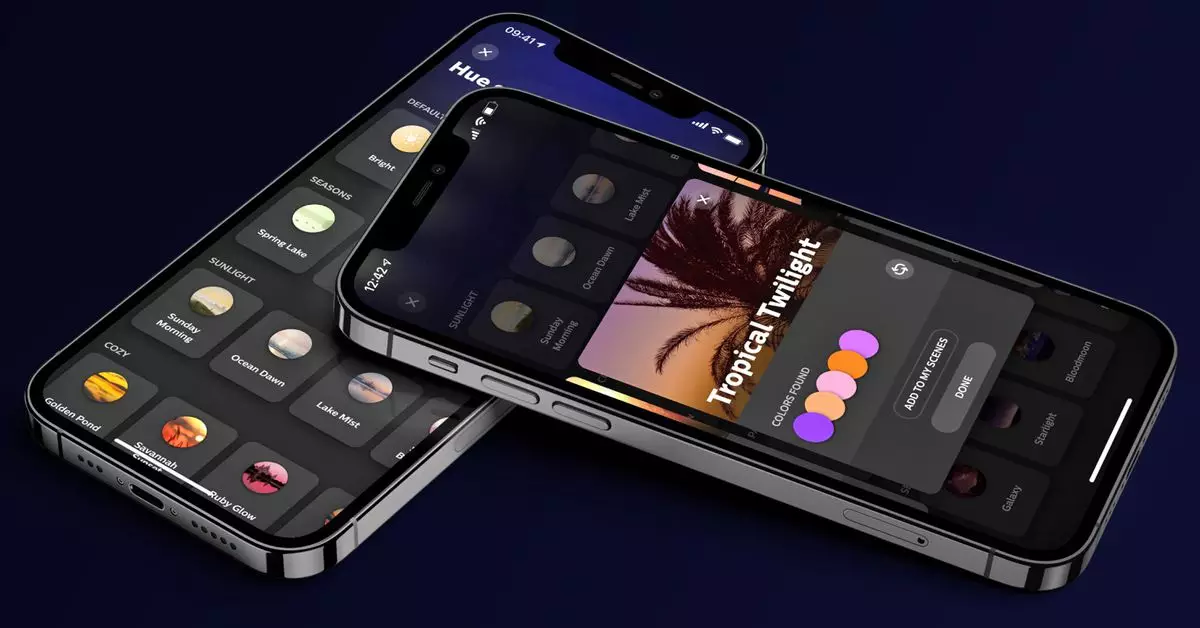Philips Hue, a prominent player in the smart lighting market, has recently unveiled an innovative feature that promises to transform user experience. The company’s announcement about the advent of an AI-driven lighting assistant has generated considerable excitement. By blending creativity with technology, Philips Hue aims to allow users to customize their lighting environments in unprecedented ways. This shift towards generative AI emulates the personal touch typically associated with human designers, making it a noteworthy advancement in home automation.
At the heart of this new feature lies the ability for users to create personalized lighting scenes tailored to their specific needs—be it for a lively garden party or a quiet evening of reading. By simply submitting typed commands such as “Create a scene for a romantic dinner,” users can receive intelligently crafted suggestions for their space. This is not just a matter of auto-suggestions; the generative AI analyses the context provided by the user to formulate a lighting scheme that complements the occasion.
Moreover, users will have the added convenience of issuing voice commands, significantly enhancing usability. The integration of voice recognition signifies a forward step towards a fully immersive smart home environment where lighting can adapt as organically as a conversation might unfold.
While the concept of AI-generated lighting is gaining traction, Philips Hue isn’t alone in this venture. Competitors such as Govee and Nanoleaf have already introduced similar features, allowing users to manipulate their lighting through dynamic effects and preset phrases. However, what sets Philips apart is the blend of voice command capabilities with a broader array of customizable options. While the other brands make use of pre-set scenes, Philips Hue’s AI assistant prides itself on generating unique scenes based on user input, which can potentially lead to a far superior level of personalization.
One of the bold claims made by Philips Hue is that this generative AI assistant will function compatibly across their entire range of lighting products. This versatility will likely appeal to existing users who have invested in Philips Hue systems. However, details regarding the rollout timeline remain vague, with expectations indicating availability in early 2025. Customers will certainly be looking forward to experiencing firsthand how this technology can refashion their living spaces with just a few words.
Beyond the generative AI lighting assistant, Philips Hue has made intriguing announcements aiming to elevate the user experience. The integration of support for LG TVs with the Philips Hue Sync app adds an extra level of functionality, allowing ambient lighting to be synchronized with on-screen content, thereby enriching the entertainment experience. Additionally, the introduction of the Philips Hue Datura ceiling light emphasizes the commitment to innovation with customizable features to suit varied aesthetics, starting at a price point of $299.99.
The integration of AI in home lighting solutions marks a pivotal point in the evolution of smart home technology. With customizable features that resonate with personal experiences, Philips Hue’s new generative AI assistant not only enhances the appeal of smart lighting but also represents a broader trend towards interconnected, responsive home environments. As consumers increasingly seek tailored experiences in every aspect of their lives, innovations like these from Philips Hue are likely to position the brand at the forefront of the smart lighting industry.


Leave a Reply